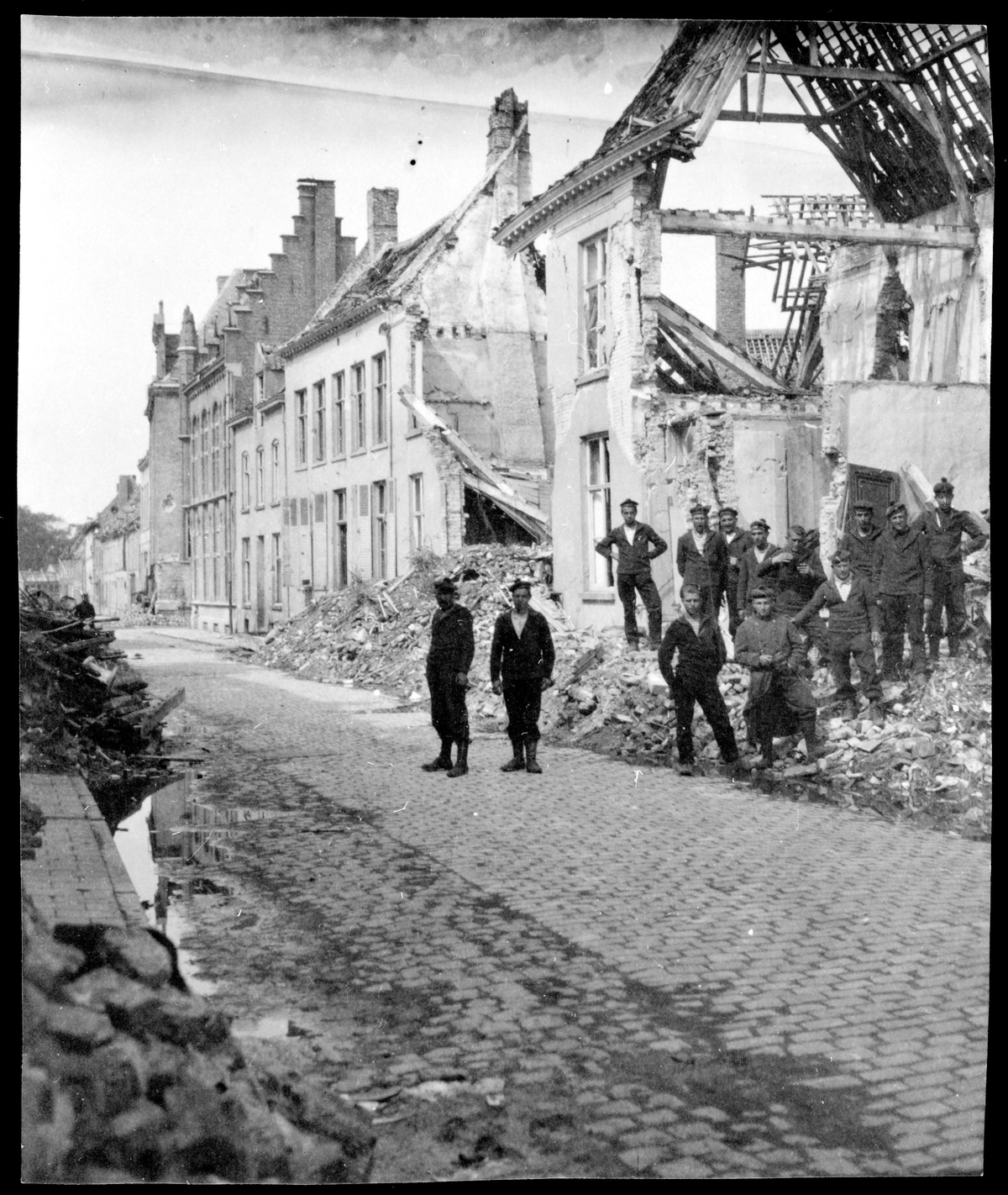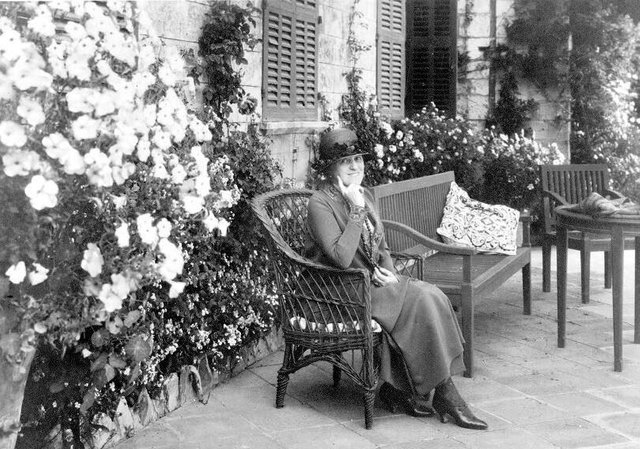Forgotten Works of 1918: Reassessing Edith Wharton's 'The Marne'
My past two entries for #explore1918 have dealt with serious political issues: specifically, censorship and sedition in wartime through the lens of the Philadelphia Tageblatt trial; and an odd and unsuccessful effort to associate Balkan state self-determination with the Declaration of Independence and Second Continental Congress.
I also want to explore some cultural aspects of 1918, and I’ll begin by reviewing The Marne, a nearly-forgotten work written by American novelist Edith Wharton that is handily available in the public domain. I’m a fan of Wharton’s novels and short stories, books like The Age of Innocence, The House of Mirth, and even Ethan Frome (the latter of which has tormented high schoolers for generations, and which you can see satirized below):
Edith Wharton, American Expatriot in World War I France
Anyway, at the time that Wharton published The Marne: A Tale of the War, she had been living in war-torn France for several years. Working as a war correspondent and active in refugee relief efforts, she was awarded the title of Chevalier of the Legion of Honour by French President Raymond Poincaré (the country’s highest honor). This is a singularly overlooked period of her life; it is left out of her Encyclopedia Britannica entry altogether. But it impacted Wharton greatly. Although her later novels continued to draw on familiar early themes of hypocrisy and scandal in high society, they also exhibited a new cynicism of the postwar world. Robert K. Martin asserts that The Age of Innocence, for which she won the Pulitzer Prize in Literature in 1921, was “fundamentally about America and its failure to fulfill its own possibilities.” [1]

Photograph taken by Wharton in 1915 at Nienport. Source
The Marne is short as Wharton’s novels go; it’s also thematically distinct, at least outwardly. The plot follows American teenager Troy Belknap as he strives toward- and accomplishes- his goal of going to France to aid in the war effort, eventually taking part in the Second Battle of the Marne. Scattered throughout is scathing commentary about both pacifists and thrill-seeking war hawks. It was well-received at the time of its publication: the New York Times declared that “The use of ‘The Marne’ as the name of a book would be for nearly any writer presumption unspeakable; no higher praise can be given to this volume of Mrs. Wharton's than to say that it justifies its author's choice of a title. For within its few pages, less than 150 in all, is concentrated much, if not the whole, of the meaning of the Marne, both to France and to America.” [2]
Is it Propaganda?
Later critics have dismissed the novel as inferior, and noted its propagandistic flavor, especially considering Wharton did put out other such works (for instance, she edited The Book of the Homeless). The story contains a lot of tired tropes: the boy who’ll do anything to go to war, a nick-of-time rescue by the Angel of the Battlefield, a plethora of apathetic or cowardly American civilians, and a cast of condescending do-gooder women bent on reforming the dirty French. It’s a quick read but often bombastic and highly dramatized, and the plot is pretty weak and sometimes boring. It’s understandable that it might fade into the background of Wharton’s bibliography, particularly when it was immediately followed by The Age of Innocence. But I think there’s more going on than meets the eye, which would follow with Wharton’s characteristic style of subtle dramatic irony. As a 1929 profile of the author in The New Yorker noted, “Mrs. Wharton’s real excellencies are never marketed. Even those who love her most come by accident upon her golden qualities.” [3]

Edith Wharton in France, 1920. Source
This novel could only be truly propagandistic if its intent were to glorify Americans going to fight in the Great War. And superficially, it seems that this is the case, as boy-hero Troy holds himself up as an example contrasted against the other Americans he meets, who are selfishly concerned with only their own problems. He scorns both the Americans who are apathetic about the war and those that are caught up in the excitement of fighting abroad.
Rethinking the Message 100 Years On
But Troy is kind of a brat. He idealizes France, his family’s vacation spot, because he remembers the idyllic countryside from forays with his tutor. He manipulates his parents to allow him to go and aid in the ambulance corps by wheedling their permission as a “birthday gift.” Then, once he arrives, he does his job poorly, having established earlier that he is not a very good driver. Finally needed in the heat of battle, he is trusted to convey an ambulance to the front lines, only to abandon the people sheltering inside of it when an opportunity arises to grab a gun and join the action. Figuring he can just figure things out as they go by imitating the experienced soldiers, he endangers their lives and winds up in the hospital- after having been miraculously saved by the spitting image of his former tutor, who exclaims “My poor little boy!” as he carries him from the battlefield.
In the end, Troy’s obsession with the glamour of battle endangers his own life and the lives of others around him. He thinks he’s better than the Red Cross nurses who clamor to work on the front lines to fulfill their own egotistical need for excitement, but in reality he’s just like them. He’s certainly no model soldier; he’s just another selfish American. So how is this a triumphant narrative, much less one to inspire emulation? How is this propaganda?
I think that it’s worthwhile to revisit this work, to reassess what it’s saying about patriotism and charity and American involvement (or lack thereof) in global issues, including but not limited to armed conflicts. Initiated in large part due to American participation in World War I and the peace negotiations that followed, the U.S. is now firmly entrenched in world affairs 100 years later. If non-intervention is no longer an option, that is to say if we live in a truly globalized context, is it possible in 2018 to be the selfish American of Wharton’s novel? What does it mean for the U.S. to fail to “fulfill its own possibilities” when the possibilities are endless?
100% of the SBD rewards from this #explore1918 post will support the Philadelphia History Initiative @phillyhistory. This crypto-experiment conducted by graduate courses at Temple University's Center for Public History and MLA Program, is exploring history and empowering education. Click here to learn more.
Works Cited
Robert K. Martin. "Ages of Innocence: Edith Wharton, Henry James, and Nathaniel Hawthorne." The Henry James Review 21, no. 1 (2000): 56-62. https://muse.jhu.edu/.
“Mrs. Wharton’s Story of the Marne.” The New York Times (Dec 8, 1918).
Flanner, Janet. “Dearest Edith.” The New Yorker (Mar. 2, 1929). https://www.newyorker.com/magazine/1929/03/02/dearest-edith/.
Nice hook.
Of the early 20th century American women novelists, I've always read Willa Cather, but what Wharton should I read first when I have actual time to read anything for pleasure?
I'd suggest wading in with her short stories! There's a good collection of ghost stories that she wrote, and also one focused around New York that I can lend you if you want. Also, for real, Ethan Frome <3
Ok sweet! I need some more Progressive Era Lit in my life.
Hi, I'm here new, I like your blog, I hope for reciprocity and invite you to my profile
Thanks!